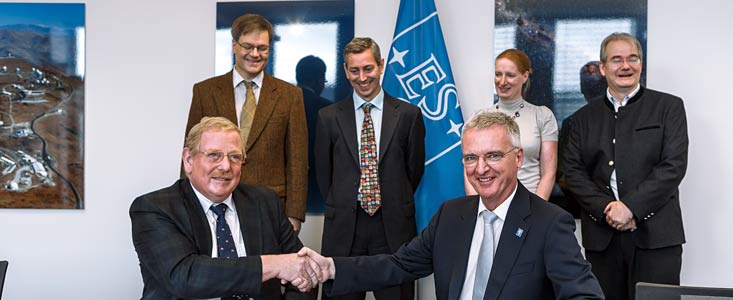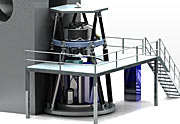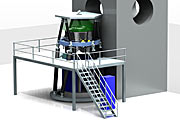Meddelelse
Aftalen underskrevet for MICADO-kameraet til E-ELT
18. september 2015
ESO har underskrevet en aftale med et konsortium af institutter rundt omkring i Europa[1] om design og bygning af et kamera til E-ELT teleskopet. Kameraets navn bliver the MICADO (en forkortelse af Multi-AO Imaging Camera for Deep Observations). Det bliver et af de første instrumenter, som er klart til brug når kæmpeteleskopet E-ELT (European Extremely Large Telescope) står klar omkring 2024. MICADO bliver i stand til som det første at tage billeder via kæmpeteleskopet, og takket være adaptiv optik bliver det de skarpeste billeder nogensinde, optaget fra Jordens overflade.
Aftalen blev underskrevet på vegne af konsortiet af Reinhard Genzel, som er direktør for Max-Planck-Institut für extraterrestrische Physik og af Tim de Zeeuw, som er generaldirektør for ESO, ved en ceremoni i ESOs hovedkvarter den 18. september 2015. Til stede var også MICADOs chefforsker Ric Davies.
Med MICADO kan E-ELT helt fra starten anvendes til nær-infrarøde himmeloptagelser helt til den teoretiske grænse, som optikkens love bestemmer. Det ønsket om høj følsomhed, høj opløsning, stor positionsnøjagtighed og et bredt bølgelængdeområde, som har være hovedønsket for dette instrument.
MICADO er beregnet til at blive integreret med det nyskabende laserstyringssystem MAORY (Multi-conjugate Adaptive Optics RelaY), men kameraet kan også fungere sammen med andre typer af adaptiv optik.
Med MICADO kan kæmpeteleskopets fulde opløsningsevne udnyttes indenfor mange forskningsområder. Der kan blandt andet være tale om detaljerede billeder af galakser med høj rødforskydning, enkeltstjerner i nabogalakserne og opdagelse og detailstudier af exoplaneter, idet kameraet får indbygget en coronagraf - en blænde, som fjerner det direkte lys fra enkeltstjerner. Andre studiemål vil være områder med meget kraftige tyngdefelter, som for eksempel tæt på det supertunge sorte hul i Mælkevejens centrum.
Ud over at fungere som billeddannende kamera, vil MICADO også kunne bruges som enkeltspaltespektrograf. I den funktion kan man optage spektrer af kompakte objekter. Sådanne objekter findes i mange af astronomiens forskningsfelter; massebestemmelse af sorte huller i galaksernes centrer, aldersbestemmelse af fjerne galakser med høj rødforskydning og bestemmelse af galaksernes sammensætning og historier. Desuden kan instrumentet optage spektrer af supernovaer, som er slutprocesserne for den første generation af tunge stjerner i Universet.
MICADO er kulminationen af et årelangt udviklingsarbejde, både hos ESO og i forskerkredsen. Det skal især nævnes, at Sandro D'Odorico fra ESO har været igangsætter af nogle af de tidlige instrumentstudier.
Note
[1] MICADOkonsortiet består af følgende: MPE: Max-Planck-Institut für extraterrestrische Physik (Tyskland); MPIA: Max-Planck-Institut für Astronomie (Tyskland); USM: Universitäts-Sternwarte München (Tyskland); IAG: Georg-August-Universität Göttingen/Georg-August-Universität; Göttingen Stiftung Öffentlichen Rechts (Executing institute: Institute for Astrophysics) (Tyskland); NOVA: Netherlands Research School for Astronomy (Nederlandse Onderzoekschool voor de Astronomie) (Nederlandene); CNRS/INSU: Centre National de la Recherche Scientifique/Institut National des Sciences de l’Univers (repræsenterer LESIA, GEPI and IPAG) (Frankrig); A*: Et Østrigs partnerskab repræsenteret ved University of Vienna (The A* partnership comprises the University of Vienna, the University of Innsbruck, the University Graz, the University of Linz and RICAM Linz [Austrian Academy of Sciences]. Contributions to MICADO come from Vienna, Innsbruck, Graz and Linz.) (Østrig), og INAF-OAPD: National Institute for Astrophysics at the Observatory of Padova (Italien).
Links
- MICADO: the E-ELT Adaptive Optics Imaging Camera (Davies et al., 2010)
- MICADO (Max-Planck-Institut für extraterrestrische Physik)
- MICADO at Universität Göttingen
Kontakter
Ole J. Knudsen
ESON-Danmark Stellar Astrophysics Centre Aarhus Universitet
tlf 8715 5597, mobil 4059 5420
e-mail: eson-denmark@eso.org
Om meddelelsen
| Id: | ann15068 |
Our use of Cookies
We use cookies that are essential for accessing our websites and using our services. We also use cookies to analyse, measure and improve our websites’ performance, to enable content sharing via social media and to display media content hosted on third-party platforms.
ESO Cookies Policy
The European Organisation for Astronomical Research in the Southern Hemisphere (ESO) is the pre-eminent intergovernmental science and technology organisation in astronomy. It carries out an ambitious programme focused on the design, construction and operation of powerful ground-based observing facilities for astronomy.
This Cookies Policy is intended to provide clarity by outlining the cookies used on the ESO public websites, their functions, the options you have for controlling them, and the ways you can contact us for additional details.
What are cookies?
Cookies are small pieces of data stored on your device by websites you visit. They serve various purposes, such as remembering login credentials and preferences and enhance your browsing experience.
Categories of cookies we use
Essential cookies (always active): These cookies are strictly necessary for the proper functioning of our website. Without these cookies, the website cannot operate correctly, and certain services, such as logging in or accessing secure areas, may not be available; because they are essential for the website’s operation, they cannot be disabled.
Functional Cookies: These cookies enhance your browsing experience by enabling additional features and personalization, such as remembering your preferences and settings. While not strictly necessary for the website to function, they improve usability and convenience; these cookies are only placed if you provide your consent.
Analytics cookies: These cookies collect information about how visitors interact with our website, such as which pages are visited most often and how users navigate the site. This data helps us improve website performance, optimize content, and enhance the user experience; these cookies are only placed if you provide your consent. We use the following analytics cookies.
Matomo Cookies:
This website uses Matomo (formerly Piwik), an open source software which enables the statistical analysis of website visits. Matomo uses cookies (text files) which are saved on your computer and which allow us to analyze how you use our website. The website user information generated by the cookies will only be saved on the servers of our IT Department. We use this information to analyze www.eso.org visits and to prepare reports on website activities. These data will not be disclosed to third parties.
On behalf of ESO, Matomo will use this information for the purpose of evaluating your use of the website, compiling reports on website activity and providing other services relating to website activity and internet usage.
Matomo cookies settings:
Additional Third-party cookies on ESO websites: some of our pages display content from external providers, e.g. YouTube.
Such third-party services are outside of ESO control and may, at any time, change their terms of service, use of cookies, etc.
YouTube: Some videos on the ESO website are embedded from ESO’s official YouTube channel. We have enabled YouTube’s privacy-enhanced mode, meaning that no cookies are set unless the user actively clicks on the video to play it. Additionally, in this mode, YouTube does not store any personally identifiable cookie data for embedded video playbacks. For more details, please refer to YouTube’s embedding videos information page.
Cookies can also be classified based on the following elements.
Regarding the domain, there are:
- First-party cookies, set by the website you are currently visiting. They are stored by the same domain that you are browsing and are used to enhance your experience on that site;
- Third-party cookies, set by a domain other than the one you are currently visiting.
As for their duration, cookies can be:
- Browser-session cookies, which are deleted when the user closes the browser;
- Stored cookies, which stay on the user's device for a predetermined period of time.
How to manage cookies
Cookie settings: You can modify your cookie choices for the ESO webpages at any time by clicking on the link Cookie settings at the bottom of any page.
In your browser: If you wish to delete cookies or instruct your browser to delete or block cookies by default, please visit the help pages of your browser:
Please be aware that if you delete or decline cookies, certain functionalities of our website may be not be available and your browsing experience may be affected.
You can set most browsers to prevent any cookies being placed on your device, but you may then have to manually adjust some preferences every time you visit a site/page. And some services and functionalities may not work properly at all (e.g. profile logging-in, shop check out).
Updates to the ESO Cookies Policy
The ESO Cookies Policy may be subject to future updates, which will be made available on this page.
Additional information
For any queries related to cookies, please contact: pdprATesoDOTorg.
As ESO public webpages are managed by our Department of Communication, your questions will be dealt with the support of the said Department.





